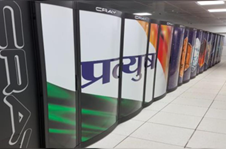

Context
According to the Ministry of Earth Sciences (MoES), India is set to dramatically scale up its super-computing prowess and install an 18-petaflop system over the course of this year.
Key highlights:
- The most important details are that India's most powerful supercomputers, Pratyush and Mihir, with a combined capacity of 8 petaflops, are housed at the Indian Institute of Tropical Meteorology (IITM) and the National Centre for Medium Range Weather Forecasting (NCMRWF).
- These supercomputers were made operational in 2018 at an investment of 438 crore and will be housed at the IITM and NCMRWF.

Imported from France
- The Government of India has signed a deal with France to procure high-performance computers worth 4,500 crore by 2025.
- The new earth-sciences Ministry computers are likely to cost 900 crore and will improve resolution to 6*6 km, meaning four times as many pixels can be used to represent a given area.
- The fastest high-performance computing system in the world is currently the Frontier-Cray system at Oakridge National Laboratory, with a peak speed of 1 exa-flop.
- The top 10 other systems range from 400 petaflops to 60 petaflops.
|
About Supercomputer:
|


